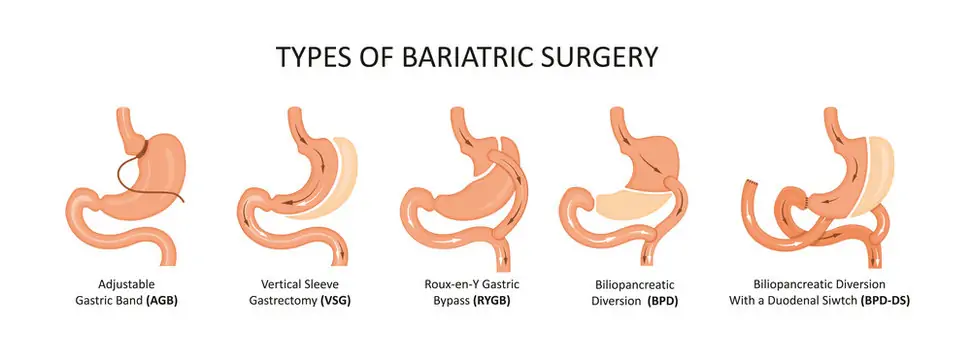
Obesity (Bariatric) Surgery Operation Details Istanbul Turkey |
||
|---|---|---|
 Accommodation 5-7 Days |
 Hospital Stay 3 Day |
 Operation Duration 1-3 Hours |
 Anaesthesia general anesthesia |
 Recovery Duration 15-20 Months |
 Follow Up Visit 5-7th Day |
Click Here For More Information |
||
What Is Weight Loss Surgery in Istanbul Turkey?
Weight loss surgery, also known as bariatric surgery, changes the shape and function of the digestive system. Bariatric surgeries can help with weight loss and management of obesity-related medical conditions (risk factors for heart disease and stroke, diabetes, and sleep apnoea).
Weight loss surgeries consist of a variety of surgical procedures; however, they all help you lose weight by limiting the amount you can eat, or some by limiting the amount of nutrients that will be absorbed.
Weight loss surgeries may be the best long-term solution for many patients who cannot lose weight with diet despite all efforts for a long time and under strict control.
Weight loss surgeries can be performed laparoscopically. This results in smaller invisible scars and faster wound healing. In addition, the risk of postoperative complications is lower with laparoscopic surgery.
Patients considering weight loss surgery should be prepared to make radical changes in their eating and lifestyle before having these surgeries. Because the changes to be made with these surgeries are changes that will last a lifetime.
Weight loss surgeries provide only an extra helping to extremely obese people and give them time to regulate their eating habits. Therefore, patients should not see weight loss surgery as a definitive solution and should know that they cannot return to their old eating habits after the surgery.
Weight loss surgeries are part of a comprehensive treatment plan that includes regular exercise and healthy eating programs after surgery.
Types Of Weight Loss Surgery
The main weight loss surgeries are as follows:
- Sleeve gastrectomy surgery
- Roux-en-Y gastric bypass surgery
- Biliopancreatic diversion with duodenal switch (BPD/DS)
- Single anastomosis duodeno–ileal bypass with sleeve gastrectomy (SADI-S)
Weight loss surgeries can be also grouped under two main headings: restrictive and malabsorptive/restrictive.
Sleeve gastrectomy surgery is a restrictive surgery and is a surgery that aims to slow down digestion by reducing the size of the stomach and thus providing earlier fullness. While a normal stomach volume is about 1.5-2 litres (maximum 3-4 litres), after surgery, the stomach volume decreases to 30 ml (1 ounce). Stomach volume may increase up to 60-90 ml (2-3 ounces) at the most in the late periods after the surgery. The smaller the stomach, the less you can eat. The less you eat, the more weight you lose.
Roux-en-Y gastric bypass surgery, biliopancreatic diversion with duodenal switch (BPD/DS) and Single anastomosis duodeno-ileal bypass with sleeve gastrectomy (SADI-S) is a combination of malabsorptive and restrictive surgeries, basically in addition to a smaller stomach volume. part of the digestive tract is removed or the area where digestion takes place is bypassed. In addition to reducing the volume of food entering the stomach, this makes the absorption of nutrients more difficult and contributes to weight loss even more. Because of the side effects of these surgeries, such malabsorption surgeries are rarely preferred. However, in this category, Roux-en-Y gastric bypass is more preferred than biliopancreatic diversion with duodenal switch (BPD/DS) because it causes less malabsorption.
Although BPD/DS (biliopancreatic diversion with duodenal switch) provides very effective results in weight loss, it carries too many risks in the long term after surgery as it causes severe malnutrition and vitamin deficiencies. This procedure can generally be preferred for extremely obese people with a body mass index (BMI) above 50, considering the pros and cons.
SADI-S is a new variant of duodenal switch surgery, unlike other types of malabsorptive bariatric surgery, by bypassing and anastomosis of one or less intestinal segments instead of two. In this way, the digestion and absorption of nutrients is less restricted. But you will still need to take your vitamins for the rest of your life.
In addition, the less time spent in surgery and the low number of anastomoses during this surgical procedure significantly reduce the risk of leakage. This makes SADI-S a less risky surgery than other types of malabsorptive bariatric surgery.

Who Is Suitable for Weight Loss Surgery?
The body mass index (BMI) recommended by general medical guidelines is taken into account when determining your eligibility for weight loss surgery. BMI is a formula that uses weight and height parameters to estimate body fat.
In order to be a candidate for one of the weight loss surgeries, you must have one of the following parameters:
- If you are an adult with a BMI of 40 or higher
- If BMI is 35 or higher and has at least one obesity-related medical condition (type 2 diabetes, high blood pressure or severe sleep apnoea)
- If you are unable to lose weight despite at least six months of supervised weight loss attempts
Sometimes, depending on the type or severity of an obesity-related diseases, some adults or adolescents with a lower BMI (30-34) may also have weight loss surgery.
What Are the Advantages of Weight Loss Surgery?
Weight loss surgery can help you lose weight and improve many of the following obesity-related health issues:
- Type 2 diabetes
- High blood pressure
- Cardiovascular disease
- Unhealthy cholesterol levels
- Obstructive sleep apnoea
- Incontinence
- Knee, hip, or other body pain
- Fertility
- Depression
- Metabolic syndrome
- Pregnancy complications
- Gallbladder disease
What are the Risks and Side Effects of Weight Loss Surgery?
Complications commonly encountered in weight loss surgeries are as follows:
- Pneumonia
- Blood clots
- Infection
- Bleeding
- Leakage of luminal contents into the abdominal cavity in sutured and/or stapled lines (this possibility can be significantly reduced by the double suturing technique [both suturing and stapling])
- Ulcers
- Hernia
- Gallstones
Most of the above complications can also be seen in abdominal surgeries performed for other reasons. In addition, these risks associated with weight loss surgery are less severe compared to the risks of remaining morbidly obese, and most of them can be prevented if detected early with good follow-up after surgery.
What Is the Cost of Weight Loss Surgery in Turkey?

All weight loss surgeries (bariatric surgeries) are risky and costly surgeries. In recent years, Turkey has become one of the most popular destinations with competitive weight loss surgeries prices with high quality conforming to European and or American standards. In the table below, the prices of weight loss surgeries are compared based on some countries.
Weight Loss Surgeries | Turkey (USD) | USA (USD) | UK (GBP) | Germany (EURO) |
Gastric Sleeve Surgery | 2500-11000 | 15000-19000 | 7900-11000 | 5000-16000 |
Gastric Bypass Surgery | 3400-12500 | 15000-35000 | 8000-15000 | 12000-30000 |
Duodenal Switch Surgery | 4700-5200 | 23000-34000 | 8500-16000 | 12900-22400 |
Why You Should Perform Weight Loss Surgeries in Istanbul Turkey?
Weight loss surgeries are surgeries that requires experience and extensive medical care. These are surgeries that can carry very serious risks if not performed under the right conditions and in accordance with the guidelines. Therefore, they are important that reliable surgeons and high quality post-operative care services are provided. Despite this, complications may still occur, but most of them can be prevented with good post-operative care and close monitoring. Such complications are also possible complications in the best hospitals in your country and under the management of surgeons.
Weight loss surgeries can be performed in many countries with reasonable price advantages, but the results may not be as successful as in Turkey. That is why it is very important that you choose a safe and suitable country.
Turkey has recently become one of the countries that offers the best in plastic surgery and obesity surgeries and has achieved high success in weight loss surgeries with high standards of medical care. Recent scientific studies reveal that Turkey is the most reliable country in terms of average success rate for weight loss surgeries.
Besides the competitive low prices and best surgeons (most of them American and or European board certified) in Turkey for weight loss surgeries, Istanbul has a lot of natural and historical beauties. From the past, Istanbul hosted a lot of different folks and empires. When you travel for your weight loss surgeries, you will learn about different cultures and living at the same time. You will see many historical places. So, this will be not only a therapeutic journey for you, but also a beautiful historical trip.
Istanbul also offers you many accommodation options suitable for your budget. If you wish to stay in 5-star hotels, they offer many Turkish things to do such as Turkish bath or local Turkish entertainments. Or you can prefer a boutique hotel and enjoy the natural beauties of Istanbul.
Istanbul is one of the best places to be preferred for weight loss surgeries. Because it offers very good activities both before and after the procedure. Performing the procedure accelerates the recovery process of the patient and the patient quickly returns to his daily activities. You can stay in hotels with a view of the Bosphorus in Istanbul, or if you wish, you can join the boat tours organized on the Bosphorus. Istanbul is the most developed city in Turkey and it is possible to see this development in every area from shopping to transportation.
Working Hours
- Monday: 09:00 – 18:00
- Tuesday: 09:00 – 18:00
- Wednesday: 09:00 – 18:00
- Thursday: 09:00 – 18:00
- Friday: 09:00 – 18:00
- Saturday: 09:00 – 18:00
- Sunday: Closed
